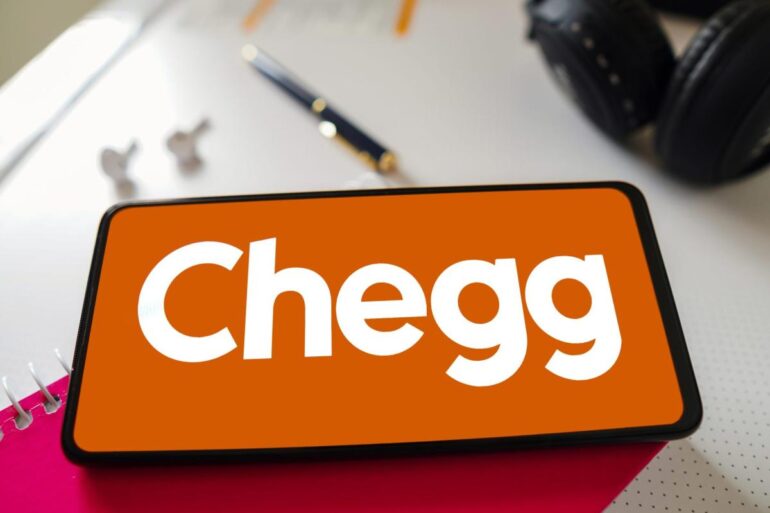TL;DR:
- Chegg’s stock price plummeted by 49% due to a decline in subscriptions attributed to ChatGPT.
- Students are turning to ChatGPT as an alternative for learning and homework assistance.
- Chegg initially saw no impact from ChatGPT but experienced a significant spike in student interest since March.
- ChatGPT allows students to generate text and find answers to homework questions, leading to concerns about academic integrity.
- Chegg is adapting to the rise of AI by developing its own educational chatbot called Cheggmate.
- The company’s recent financial report shows a decline in total net revenues, subscription services revenues, and subscriber numbers.
- Chegg’s CEO, Dan Rosensweig, expects the downward trend in subscriptions to continue and hopes that Cheggmate can help recover losses.
- Analysts have revised their share price targets for Chegg, expressing concerns about the impact of AI on the company.
- Chegg’s shares are currently trading at around $9, a significant drop from the previous high.
- Rosensweig assures investors that Chegg’s retention rate among existing subscribers remains high and that the company is actively adapting to the technological shift.
- Chegg is committed to aggressive strategies, adjusting its cost structure, and preparing for future success in the evolving market.
Main AI News:
In a startling turn of events, Chegg, the education technology company, witnessed a staggering 49 percent decline in its stock price on Tuesday, resulting in a loss of nearly $1 billion in market valuation. The unexpected setback was attributed to a decline in subscriptions, a consequence of students gravitating towards the use of ChatGPT, an artificial intelligence (AI) model developed by OpenAI.
Renowned for its software that aids students in learning and preparing for classes, Chegg provides an array of services ranging from study apps and textbook rentals to online tutoring. During its first-quarter earnings announcement, CEO and co-chairperson Dan Rosensweig candidly acknowledged the company’s faltering subscriptions as students increasingly turned to alternatives such as OpenAI’s ChatGPT.
Initially, Chegg observed no discernible impact on its new account growth due to ChatGPT meeting expectations on new sign-ups in the early part of the year. However, starting in March, the company witnessed a substantial surge in student interest in ChatGPT. As a result, it is now believed that this AI-powered tool is indeed influencing the company’s acquisition of new customers, as stated by Rosensweig during an earnings call.
ChatGPT offers students the ability to generate text based on given instructions, enabling them to seek answers to their homework questions or even generate essays. Consequently, certain educational institutions have taken measures to block student access to ChatGPT on their networks. Moreover, several universities are experimenting with AI-driven software designed to detect submissions written by AI, albeit with varying levels of success.
Amidst this transformative landscape, Chegg finds itself compelled to adapt to the rise of large language models by embracing AI technology. Rosensweig disclosed that Chegg has partnered with OpenAI to develop an educational chatbot called Cheggmate. The company plans to release the beta version of this innovative product in the coming month. Although the pricing details are yet to be finalized, Rosensweig indicated that subscriptions for the LLM chatbot could start as low as $15.95 or $19.95 per month.
However, Chegg’s recent financial report paints a gloomy picture of the company’s future prospects as it stakes its hopes on AI. The report highlights the following key figures:
- Total net revenues of $187.6 million, reflecting a 7 percent decline year-over-year.
- Subscription services revenues amounted to $168.4 million, indicating a 3 percent drop compared to the previous year.
- A decrease of 5 percent in the number of Subscription Services subscribers, totaling 5.1 million, year-over-year.
- Net income of $2.2 million, less than half of the figure from the previous year, which stood at $5.7 million.
Rosensweig expressed concerns that the downward trend in subscription revenues is likely to persist in the upcoming quarter. It remains uncertain whether the forthcoming Cheggmate chatbot can compensate for these losses, with a clearer picture expected to emerge later in the year.
Financial analysts responded to the news by revising their share price targets for Chegg. Josh Baer from Morgan Stanley reduced the price target to $12 from $18, stating that AI has “completely overshadowed” the company’s results. Jefferies, an investment banking firm, downgraded the stock from a buy to hold, lowering its price target from $25 to $11, as reported by CNBC.
Presently, Chegg’s shares are trading at approximately $9 each, a significant drop from Monday’s peak of $18.71.
Chegg’s CEO, Dan Rosensweig, sought to assuage concerns among investors by highlighting the company’s strong retention rate among existing subscribers. He emphasized that the introduction of ChatGPT does not pose a long-term threat to the company’s stability. Rosensweig acknowledged that the technological landscape is evolving and necessitates proactive measures to adapt.
He assured stakeholders that Chegg is actively preparing for this shift, making necessary adjustments to the company, pursuing aggressive strategies, and optimizing the cost structure accordingly. Rosensweig’s resolute statement conveyed the company’s commitment to meeting the challenges head-on and positioning itself for continued success in the face of changing market dynamics.
Conlcusion:
The significant decline in Chegg’s stock price and subscription numbers, attributed to the popularity of ChatGPT among students, highlights the growing influence of AI technology in the education market. This development raises concerns for companies operating in the sector, as they must adapt to the evolving technological landscape and find innovative ways to retain their customer base.
The emergence of AI-driven tools like ChatGPT and Cheggmate indicates a shift in student preferences and emphasizes the need for education technology companies to invest in and leverage AI to remain competitive. The market must recognize the impact of large language models and explore strategies to integrate AI technology effectively while addressing potential challenges, such as academic integrity and revenue declines. Businesses that can successfully navigate this transformative phase and offer compelling AI-driven solutions are likely to thrive in the evolving educational landscape.

